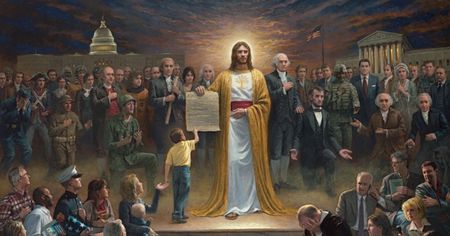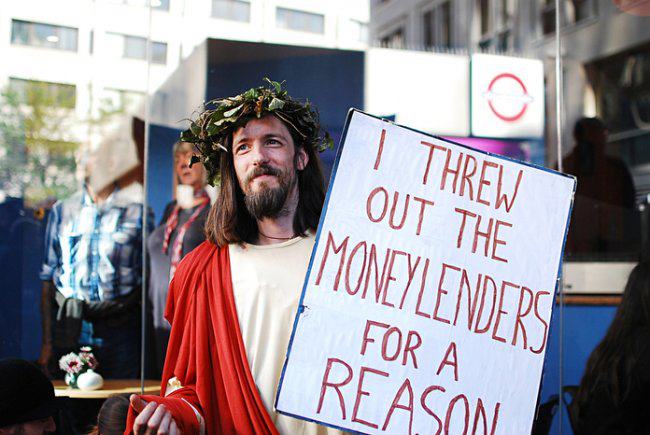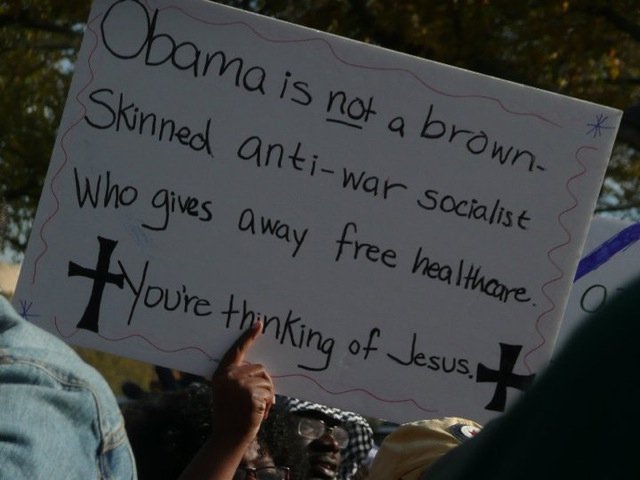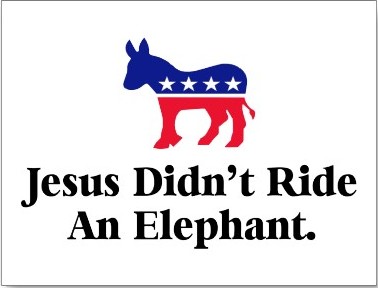Creating a Jesus in our own political image
It’s been a politically-charged year here in America. Next year we will choose a President and the course of the country will be determined for the following 4 years. Those who are dissatisfied with the current administration are vying for time to persuade American voters that they are a better choice for the job. Thus we have a competitive race among Republicans for who will be their nominee for the Oval Office. (Of course, any Dojo readers who follow me on Facebook or Twitter know very well who I support for the job and why!)
Also, over the past few weeks, Occupy Wall Street and its related movements have gained traction. More and more people, particularly those on the far Left, have formed a grassroots movement of their own in order to decry the evils of corporatism and financial greed.
Just as the Tea Party movement grew from discontent among those on the Right with Big Government, the Occupy movement has come about from the discontent among those on the Left with Big Banking.
It seems that people on both ends of the American political spectrum are frustrated, fed up and willing to take to the streets to plead their cause.
And of course, Christians who identify with either end have been very open in declaring their (often-justifiable) outrage as part of their commitment to the Gospel. For example, a friend of mine shared this image on Facebook recently:
The message is clear.
WWJD? He’d throw the bankers out of Wall Street, that’s what!
This is nothing new of course; many people on BOTH sides of the American political spectrum have been claiming to represent Jesus (or rather, that Jesus represents THEM) for as long as there have been partisan politics!
In fact, many on the Right claim to follow a Jesus who is basically a forerunner to the Founding Fathers of America. For example, there’s the (in)famous McNaughton painting depicting Jesus and the Constitution:

(Click on the image for the artist’s explanation of the piece and the figures portrayed in it)
Heck, there’s even a study Bible for those who hold such a view!
But as I’ve pointed out in the past, wrapping Jesus in the American flag, as if he were a card-carrying member of the Christian Coalition/Moral Majority is not only wrong, it’s borderline idolatrous.
But is it any different when those on the Left do the same?
Why is it that some Christians on the Left who decry the hijacking of the Gospel by the Republican/Religious Right crowd don’t seem to have a problem when those on their side of the political spectrum appropriate Jesus for their cause?
Is it any less idolatrous?
There are, to be sure, many issues Jesus spoke directly to which do have political ramifications and should form the political ideology of any Christian (including those Christians who believe that Christians shouldn’t be involved in politics at all–which is itself a political ideology in many ways!), and there is nothing wrong with bringing one’s understanding of Jesus to bear on political issues…
…however…
When doing so, we must be EXTREMELY careful that we are not creating a Jesus in our own image.
It is so easy to isolate an incident or a saying from the Gospels and make it into a slogan that has great rhetorical value–despite being completely unbiblical!
For instance, Jesus taught very clearly on issues like sexual purity and marriage–namely that it was God’s intention from the beginning that marriage be the lifelong sexual union between a man and a woman. So those who oppose the concept of same-sex marriage or support celibacy in singleness may point to the teachings of Jesus to support their arguments…
…BUT…
when looking at the whole of Scripture, Jesus was the MOST tender and forgiving of those whose sins were sexual in nature and who were stigmatized by their religious society as a result. This immediately invalidates ANY approach that is antagonistic, spiteful or stereotyping on the part of those claiming to represent Jesus.
But wait, what about the moneychangers in the Temple incident? Isn’t that a CLEAR example of Jesus being against Wall Street??
No. It is not.
If one wants to speak out against corrupt modern banking/financial institutions and corporate greed there are plenty of places in Scripture, both Old and New Testaments, which speak directly to the subject.
But Jesus’ behavior in the Temple is not one of them.
Jesus wasn’t angry that there was commerce going on in Jerusalem…he was angry because it was going on in the ONE place in the Temple where Gentiles were supposed to be able to gather:
After entering Jerusalem, Jesus heads for the temple precincts, where he creates a disturbance by evicting the merchants and money changers and overturning the tables and chairs that they were using for hawking their wares (Matt. 21:12). Justifying such inflammatory activity, he quotes Isaiah, using the simple introduction, “it stands written” (Matt. 21:13). If rabbinic sources are to be trusted, Caiaphas, the high priest, had quite recently moved the trade of sacrificial animals from the Kidron Valley to the very court of the temple designed for God-fearing Gentiles to use in worshiping and praying to Yahweh, God of Israel. Mark’s version makes this location even clearer by including “for all the Gentiles” from the Isaiah quotation (Mark 11:17). G. K. Beale and D. A. Carson, Commentary on the New Testament Use of the Old Testament (Grand Rapids, MI; Nottingham, UK: Baker Academic; Apollos, 2007), 67.
There is nothing explicitly in the text which would suggest that the moneychangers were price-gouging or engaging in unfair economic practices; in fact, they were offering services to worshipers that were in accordance with Torah regulations regarding sacrifices.
But the problem, as we see from Jesus’ quoting of Isaiah and Jeremiah, is that the Temple authorities had set up financial shop in the only area of the Temple where Gentiles were supposed to be allowed to come worship the God of Israel.
Gentiles had a right to pray in the temple as well as Jews. This quotation’s significance would not have been lost on Mark’s largely Gentile audience. Ben Witherington III, The Gospel of Mark : A Socio-Rhetorical Commentary (Grand Rapids, MI: Wm. B. Eerdmans Publishing Co., 2001), 316.
So instead of being a “light to the nations”, the Judean leaders had turned the Temple into something of a members-only club for Jews. (For more on the symbolic implications of Jesus’ actions in the Temple, click HERE.)
Such practices went against the entire calling of Israel as God’s People, and as Messiah, Jesus would not stand for it. He symbolically “cleansed” the Temple in an act that foreshadowed the coming destruction it would experience as a result of rejecting not just Him as Messiah, but also the very calling of drawing the nations to worship the God of Israel.
So those looking to the Temple-cleansing accounts in the Gospels as validation of their protests against Wall Street or other Banking/Financial institutions should look elsewhere in Scripture (I suggest the books of Amos or Revelation personally!).
Without a doubt, Jesus is the most important human being who has ever walked the earth. History is forever shaped by his teachings, his life and–for Christians–his death and resurrection. It is understandable that we would seek to have Jesus on our side when it comes to issues of politics and social justice–especially if we are trying to convince other Christians regarding our view.
However, we must tread carefully when we attempt to do so. We must pay careful attention to the whole of Scripture and not pull out and isolate parts we think will bolster our cause.
Otherwise we end up with a Jesus who looks–suspiciously–a lot like us.
Blessings from the Dojo,
JM
—————
ps: I believe Christians can hold very different political views on a number of issues and still remain unified in Christ. Politics is about strategy in governing wisely. Christians will likely have very different views on how to strategically live out the Gospel (just ask Paul and Barnabas!); but we should strive to keep things in perspective and never see political endeavors as the ultimate solution to a broken world. This doesn’t mean we must abandon political activity (just ask William Wilberforce!); but it does mean that we must be charitable–even when passionately discussing and disagreeing–with brothers and sisters in Christ who do not share our political views or strategies.
Categories: Blog, New Testament, Political/Social issues, Theological issues





[…] […]
by Weekly Meanderings | Jesus Creed on Oct 22, 2011 at 10:55 am
Good stuff. As I was reading, I got to the part with the picture of the Jesus Occupy guy with the ‘throw the money lenders out’ sign and as I read the lines, “The message is clear. WWJD? He’d throw the bankers out of Wall Street, that’s what!” I thought that was your opinion on the matter. Shocked, I continued reading. Then I got to the part about the truth of the money changers in the Temple incident and my shock was replaced with understanding about what you were saying about the picture.
by Christian on Jan 18, 2012 at 2:59 pm